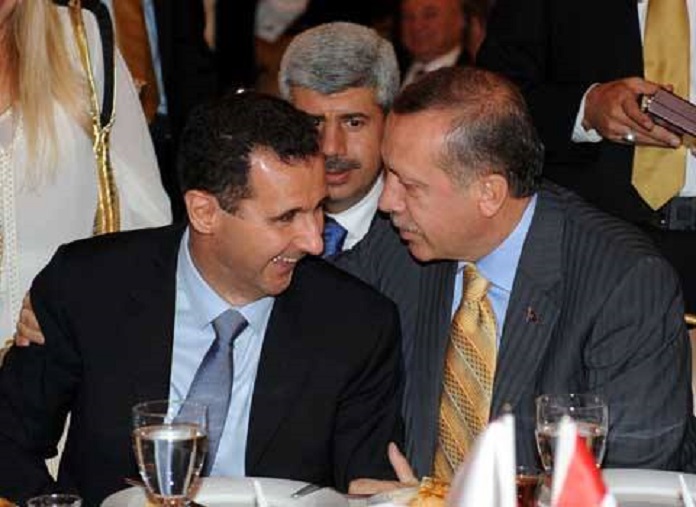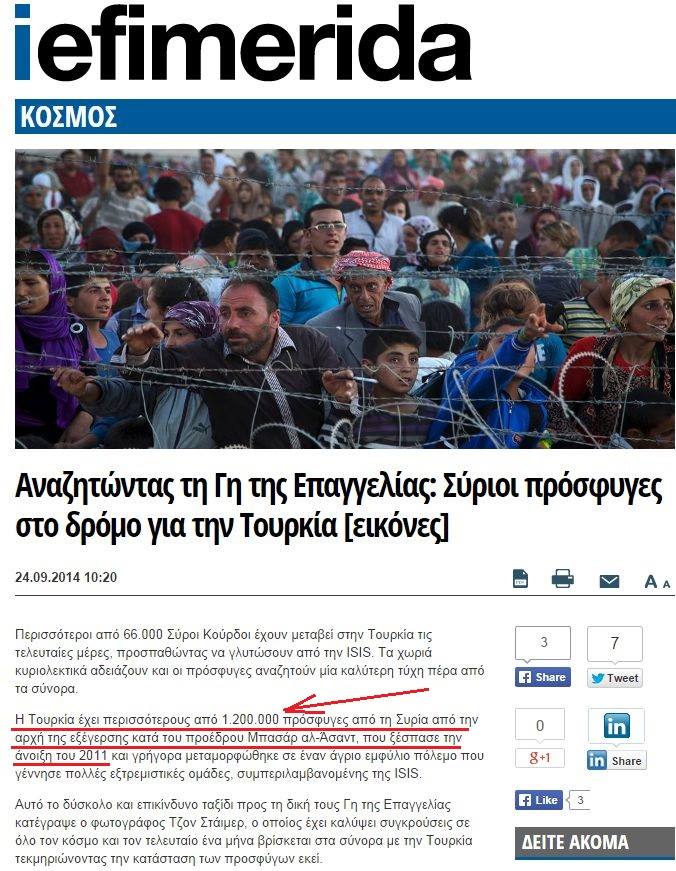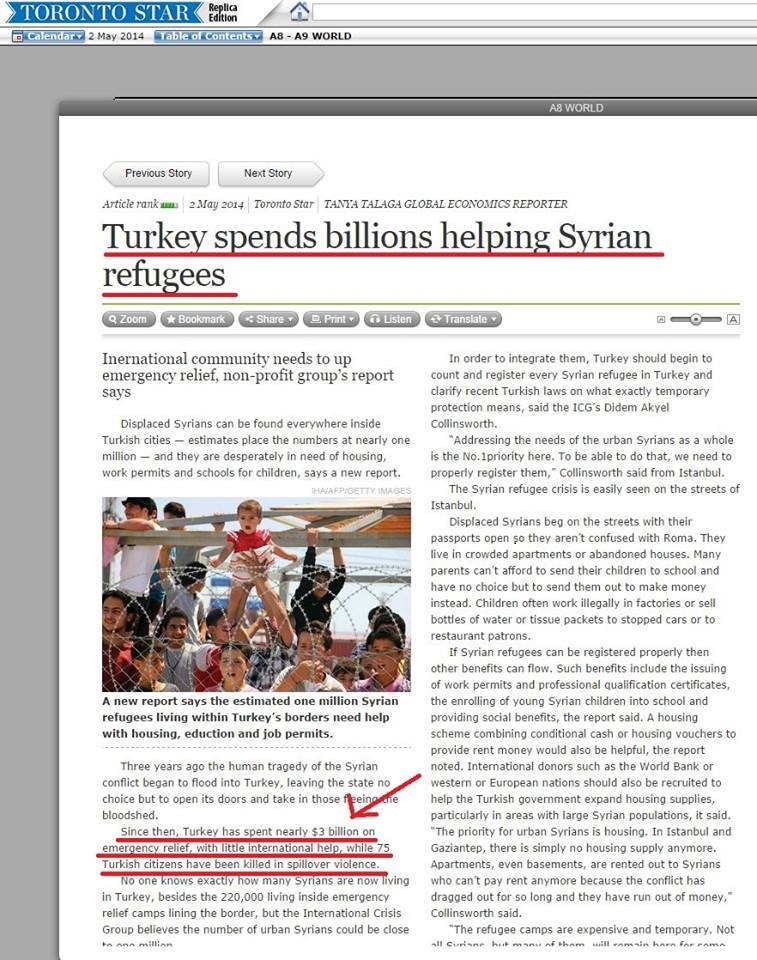 Λύθηκε ακόμα ένα μυστήριο που βασάνιζε την λογική μας.
Λύθηκε ακόμα ένα μυστήριο που βασάνιζε την λογική μας.
Δεν μπορούσαμε να εξηγήσουμε γιατί ο αντισιωνιστής Ερντογάν δεν βοηθούσε τον αντισιωνιστή Άσαντ, αντιθέτως μάλιστα, πρόσφατα ζήτησε από την Δύση να επικεντρωθεί στην ΑΝΑΤΡΟΠΗ του Άσαντ και όχι στους Κούρδους.
Αυτό έβαλε ως όρο για να συμμετέχει στον πόλεμο κατά της ISIS.
Μαθαίνουμε λοιπόν από Τούρκο αναλυτή στην φιλοσιωνιστική Χουριέτ τα παρακάτω χρήσιμα στοιχεία:
- Ο Ερντογάν διατηρούσε ΠΟΛΥ στενές φιλικές αλλά και ΟΙΚΟΓΕΝΕΙΑΚΕΣ σχέσεις με τον Σύριο Άσαντ. Μάλιστα πραγματοποιούσαν και ΚΟΙΝΑ Υπουργικά συμβούλια οι δύο γειτονικές χώρες.
- Ο Ερντογάν έφερε άμεσα αντιρρήσεις και φρέναρε τις πρώτες ενέργειες της Δύσεως εναντίον του Συρίου Άσαντ, με το σκεπτικό: «Ας του δώσουμε μία ευκαιρία!» Ήλπιζε να φανεί ως Ειρηνοποιός στα μάτια όλου του πλανήτη.
- O Ερντογάν ζήτησε από τον Άσαντ να επιταχύνει τις δημοκρατικές διαδικασίες. Οι συμβουλές του φαίνεται δεν εισακούστηκαν, η βία άρχισε να κορυφώνεται και η Τουρκία βρέθηκε να ματώνει οικονομικά, για να προσφέρει τις πρώτες βοήθειες στους Συρίους πρόσφυγες, που κατέφευγαν στα εδάφη της.
- Απ΄τον Αύγουστο του 2011 επήλθε οριστική ρήξη με τον Άσαντ και ο Ερντογάν, αφού εξαντλήθηκε η υπομονή του, κατηγόρησε ευθέως τον πρώην φίλο του ως ψεύτη.
- Προκειμένου να αποφευχθεί το μακελειό των Συρίων, από τις ύαινες του Ισραήλ, που παρίσταναν τους εξεγερμένους, και για να φρενάρουν τα γεράκια της Δύσεως, που ήλπιζαν να εκλέξουν την έτοιμη από καιρό κυβέρνηση που …«έψησε» η Bidlerberg, ο Άσαντ έπρεπε να κινηθεί γρήγορα. Όμως δεν ήξερε πόσο αποφασισμένοi κι αδίστακτοι ήταν οι εγκληματίες του Ισραήλ κι έτσι φτάσαμε στην σημερινή κατάσταση.
- Ο Ερντογάν σχεδόν 3 χρόνια τώρα υποχρεώνεται να περιθάλπει πάνω από 1.200.000 Συρίους πρόσφυγες. Το κόστος έχει ξεπεράσει τα 3 Δισεκατομμύρια δολάρια ενώ την ζωή τους έχουν χάσει τουλάχιστον 75 Τούρκοι πολίτες.
- Το ό,τι ο Άσαντ δεν ενήργησε γρήγορα και δεν ακολούθησε την φιλική συμβουλή του Ερντογάν προκάλεσε όχι μόνο την οργή του Ερντογάν, αλλά και τεράστια οικονομική ζημία και πολιτικό κόστος στον Τούρκο Πρωθυπουργό.
- Ο Ερντογάν βλέποντας την δύναμη του Κτήνους σε δράση, το μόνο που θέλει πλέον είναι να απομακρυνθεί ο Άσαντ, για να μπορέσει να ξεφορτωθεί τους Συρίους πρόσφυγες, που του κοστίζουν πολύ ακριβά κάθε ημέρα που περνάει.
- Σίγουρα δεν έχει κανέναν λόγο να βοηθήσει τους Κούρδους, εξαιτίας των οποίων η Τουρκία βρισκόταν σε εμπόλεμη κατάσταση στα ανατολικά της σύνορα, εδώ και πολλά χρόνια. Εννοείται ότι θα αντισταθεί στην δημιουργία του κράτους του Κουρδιστάν, που θα σημάνει απώλεια εδαφών.
- Η απώλεια εδαφών θα σημάνει και τεράστιο πολιτικό κόστος, τα δίκτυα πρακτόρων του Soros, θα φορέσουν τις «εθνικιστικές» στολές και θα κάψουν τις πόλεις λόγω «πληγωμένης υπερηφάνειας» ώστε να αναγκάσουν τον Ερντογάν σε παραίτηση, κάτι που επίσης είναι από καιρό στα σχέδια του Τελ Αβίβ.
Από τις γλαφυρές περιγραφές των γυναικών που πολεμούν στο Κομπάνι, που ακούμε από τα ΜΜΕ των σιωνιστών …καταλαβαίνουμε ότι από πίσω υπάρχει ατζέντα. Αυτοί που προκάλεσαν γενοκτονίες με εκατομμύρια νεκρούς σε Γιουγκοσλαβία και ΙΡΑΚ, συγκινήθηκαν ξαφνικά από 10 προσεκτικά επιλεγμένες για την φωτογένειά τους, πολεμίστριες που παίζουν ταυτόχρονα σε όλα τα ΜΜΕ του πλανήτη.
Με κάτι τέτοια επικοινωνιακά κόλπα μάζευαν λεφτά στα Χρηματιστήρια (για πολεμικά ομόλογα) οι σιωνιστές, που δήθεν θα κατέληγαν σε αγωνιζόμενα έθνη.
Η εκμετάλλευση της εικόνας μία γυναίκας που πολεμά, προσδίδει μία ιερότητα στον αγώνα της.
Οι πόλεμοι μεταξύ αντρών μπορούν να οφείλονται σε εγωισμό ή βλακεία. Όταν όμως μπαίνουν στην μάχη γυναίκες και μάνες, τότε δεν υπάρχει αμφιβολία ότι ο σκοπός τους είναι ΚΑΛΟΣ και ιερός.
Αυτό θέλουν να σκεφτόμαστε ώστε να εγκρίνουμε την αλλαγή συνόρων, που θα σημάνει αρπαγή των πετρελαίων από τα γεράκια του Ισραήλ.
Τα ίδια γεράκια που σκότωσαν 100.000 Σύριους, για να ρίξουν τον Άσαντ, και ξεσπίτωσαν 1.200.000 ανθρώπους, κάνουν πως …δακρύζουν στην θέα μιας όμορφης Κούρδισας, που πολεμάει για την «ανεξαρτησία»…
Η ζεστή αγκαλιά των βρυκολάκων τοκογλύφων Rothschild …έχει χώρο για όλους!
Με τέτοια επικοινωνιακά κόλπα μαζεύουν λεφτά δήθεν για την Αφρική και τελικά όλα καταλήγουν σε λογαριασμούς στην Ελβετία.
Where were the mistakes made in Turkey’s Syrian policy?
Where were the mistakes made in Turkey’s Syrian policy?
Everyone has now agreed that the civil war in Syria has grown and that even if President Bashar al-Assad leaves, the country has entered a period of major clashes and instability that may last many years.
In this context, those views that say Turkey has made a series of significant mistakes in the Syrian crisis both in the stages of assessment and in practice are increasingly being acknowledged.
It is possible to analyze the Syrian policy of the government with a retrospective perspective by listing its major mistakes or its controversial political preferences under the following headings.
Extreme intimacy with Bashar
Let’s go to the very beginning. The ruling Justice and Development Party (AK Party) government, much before the Arab Spring was seen on the horizon, had headed for very close and intimate cooperation with the Bashar al-Assad administration in Syria. This policy had reached, in the year 2009, such an advanced level that joint Cabinet meetings were held between the two countries and mutual visa restrictions were lifted. Also, the affectionate relations between the Erdoğan and al-Assad families somewhat warmed up the climate between the two countries.Interestingly, during this period, the AK Party government immediately opposed the United States’ efforts to put the brakes on its cooperation with the al-Assad regime – on the grounds that it supported terror – as part of an effort to get it to act more cautiously toward Damascus. Ankara argued that the reform process in Syria could only be accomplished by supporting and strengthening the hand of Bashar al-Assad against the system he took over from his father. To that end, the domestic oppressive practices of Syria were disregarded, as well as the United Nations reports on the role of Damascus in the assassination of Lebanon Prime Minister Rafic al-Hariri in 2005.
The policy of Prime Minister Recep Tayyip Erdoğan, which can be summarizes as, “Let’s give Bashar a chance; let’s try to win him over,” was based on the assumption that al-Assad would just as well change the security-centered system and that the development of economic cooperation would contribute to it. When viewed from a retrospective perspective today, we can say that when this calculation was made, credit was given to al-Assad to an extent that he did not deserve.
Persuasion attempts remained in vain
The winds of the Arab Spring started crossing the borders of Syria in March 2011. In the first period right after the incidents emerged, Erdoğan adopted a more controlled attitude toward the Damascus regime as Western centers openly took a critical stance against it. He thought he would be able to persuade Bashar al-Assad to move toward democracy and take steps in the direction of change before incidents grew by using the intimacy he had established with him.There is no doubt that the prime minister was acting in good faith in this policy of his. If it had yielded results, then Erdoğan would have gained enormous prestige in the international community as a politician who played a role in Syria’s peaceful transfer to democracy. In fact, U.S. President Barack Obama waited for a while to see whether Erdoğan’s effort would bring any results before setting his final stance against Syria. However, when Bashar opted to suppress the opposition instead of change, Ankara’s attempt was proven to be in vain.
The role of personal rage against Bashar
The most significant breaking point in Erdoğan’s stance against al-Assad was in August 2011. Following the negative responses Bashar gave to all the messages he had been sent, Erdoğan’s attitude took a U-turn. After talking to al-Assad in Aleppo at the beginning of February 2011, Erdoğan told journalists: “We share the same views with Bashar al-Assad on the developments in the region. The topic we are in accord with is certain: This is a democratic demand,” (Feb. 8, 2011). About five months later, he addressed al-Assad, saying, “Those who try to prosper with cruelty will be drowned in the blood they have shed,” (Aug. 8, 2011). One month later, he openly accused his former friend of “lying,” (Sept. 26, 2011). The statements of the prime minister followed an escalating course of harshness.We may as well consider that the reaction and the rage Erdoğan feels at a personal level for Bashar al-Assad for rejecting all the initiatives he launched for him at huge risk since the beginning of the events are among the factors that contributed to the severe discourse Erdoğan has since adopted against Syria.
Sedat Ergin is a columnist for daily Hürriyet in which this piece was published on Aug 29. It was translated into English by the Daily News staff.
August/30/2012
Ἀποποίηση εὐθύνης
Οἱ συντάκτες τῶν ἄρθρων ἀποδέχονται ὅτι φέρουν τὴν ἀποκλειστικὴ εὐθύνη γιὰ τὴ νομιμότητα, ἀλλὰ καὶ γιὰ τὴν ὀρθότητά του περιεχομένου τῶν ἄρθρων τους, ἀπαλλάσσοντας τὸ filonoi.gr ἀπὸ ὁποιανδήποτε σχετικὴ εὐθύνη.


